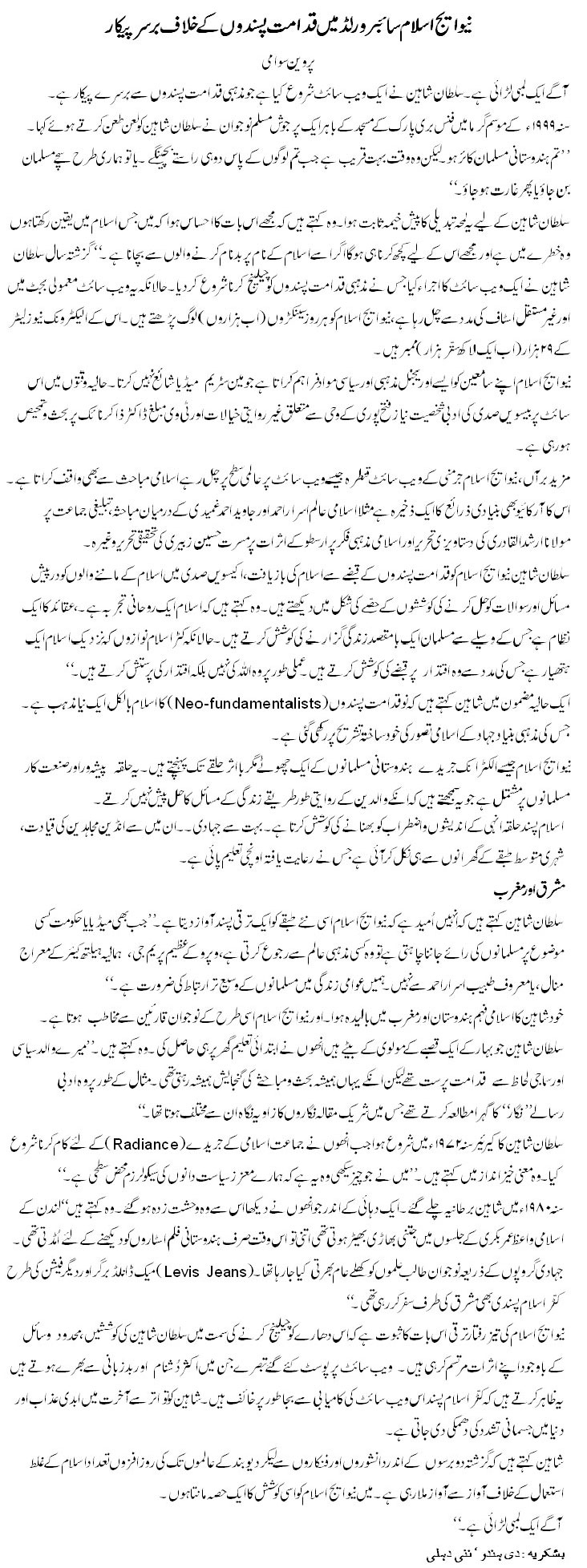| |||||
Sultan Shahin sees New Age Islam as part of a global effort by believers to reclaim Islam from the religious right, and address the questions and conflicts which confront believers in the twenty-first century. “Islam,” he argues, “is a spiritual experience; a system of beliefs through which believers seek to live a meaningful life. For the Islamists, though, religion is primarily a tool through which they seek power. In practice, they worship power, not Allah.” In a recent essay, Shahin argued that the Islam of the neo-fundamentalists was in fact a “a completely new religion” theologically founded “on a wilful misinterpretation of the Islamic concept of jihad.” Electronic journals like New Age Islam reach out to a small, but influential, section of India’s Muslims: an emerging class of Muslim professionals and entrepreneurs who are finding that the traditionalist practices of the parents offer few solutions to the struggles of life. Islamists have been adroit at capitalising on their anxieties. Many of India’s jihadists — among them, the leadership of the Indian Mujahideen — came from urban middle class backgrounds and had received a privileged elite education. Shahin says he hopes New Age Islam will give this new class a progressive voice. “When the media or the government wants to understand what Muslims think about something,” he says “they’ll always turn to some cleric or the other, not Wipro’s Azim Premji or Himalaya Heath Care’s Meraj Manal or the eminent physicist Israr Ahmed. We need a wider Muslim engagement with public life.” Shahin’s own understanding of Islam was forged in both India and the West—much like the young audience New Age Islam addresses. -- Praveen Swami, The Hindu, New Delhi
| |||||
| New Age Islam Battles Fundamentalists in Cyberspace | |
Sultan Shahin sees New Age Islam as part of a global effort by believers to reclaim Islam from the religious right, and address the questions and conflicts which confront believers in the twenty-first century. “Islam,” he argues, “is a spiritual experience; a system of beliefs through which believers seek to live a meaningful life. For the Islamists, though, religion is primarily a tool through which they seek power. In practice, they worship power, not Allah.” In a recent essay, Shahin argued that the Islam of the neo-fundamentalists was in fact a “a completely new religion” theologically founded “on a wilful misinterpretation of the Islamic concept of jihad.” Electronic journals like New Age Islam reach out to a small, but influential, section of India’s Muslims: an emerging class of Muslim professionals and entrepreneurs who are finding that the traditionalist practices of the parents offer few solutions to the struggles of life. Islamists have been adroit at capitalising on their anxieties. Many of India’s jihadists — among them, the leadership of the Indian Mujahideen — came from urban middle class backgrounds and had received a privileged elite education. West and East Shahin says he hopes New Age Islam will give this new class a progressive voice. “When the media or the government wants to understand what Muslims think about something,” he says “they’ll always turn to some cleric or the other, not Wipro’s Azim Premji or Himalaya Heath Care’s Meraj Manal or the eminent physicist Israr Ahmed. We need a wider Muslim engagement with public life.” Shahin’s own understanding of Islam was forged in both India and the West—much like the young audience New Age Islam addresses. -- Praveen Swami, The Hindu, New Delhi To read the full text of the article please click on the link below: URL: http://www.newageislam.com/NewAgeIslamIjtihadRethinkingIslam_1.aspx?ArticleID=2444 URL: http://www.newageislam.com/NewAgeIslamUrduSection_1.aspx?ArticleID=4121
| |






 Moderate Islamist here
Moderate Islamist here


0 comments:
Post a Comment